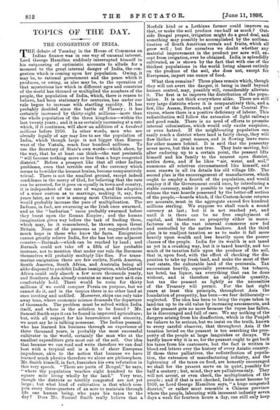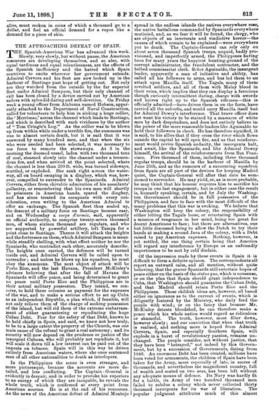TOPICS OF THE DAY.
THE CONGESTION OF INDIA.
THE debate of Tuesday in the House of Commons on Indian finance was in one way of unusual interest. Lord George Hamilton suddenly interrupted himself in his outpouring of optimistic accounts to allude for a moment to the great internal danger of India, the con- gestion which is coming upon her population. Owing, it may be, to rational government and the peace which it produces, or owing, as also may be, to the operation of that mysterious law which in different ages and countries of the world has thinned or multiplied the numbers of the people, the population of India, which, there is reason to believe, had been stationary for centuries, has under our rule begun to increase with startling rapidity. It has probably doubled since the battle of Plassey ; it has certainly increased by thirty-eight millions—more than the whole population of the three kingdoms—within the last twenty years ; and it is as certainly increasing at a rate which, if it continues, will show an addition of a hundred millions before 1950. In other words, men who are already legally of age may live to see the population of India, which though large is not bigger than Europe west of the Vistula, reach four hundred millions. To use the Secretary of State's own words—which show, by the way, that be at least can think—the vast peninsula "will become nothing more or less than a huge congested district." Before a prospect like that all other Indian problems, even that terrible one of the currency which seems to bewilder the keenest brains, become comparatively trivial. There is not the smallest ground, except indeed confidence in the mercy of God, for believing that the rate can be arrested, for it goes on equally in town and country, it is independent of the rate of wages, and the 'adoption of a wiser custom as to marriage, making it, say, five years later, as it now is among most Christian converts, would probably increase the pace of multiplication. The Indians, in fact, are swarming as the Irish once swarmed, and as the " barbarian " races probably swarmed before they burst upon the Roman Empire ; and the human imagination gives way before the task of feeding them, which may, be it remembered, be thrown upon Great Britain. None of the panaceas as yet suggested excite much hope in those who know the facts. Emigration cannot greatly relieve India, for she has but one adjacent country—Burmah—which can be reached by land ; and Burmah could not take off a fifth of her probable increase, not to mention that under our rule the Burmese themselves will probably multiply like flies. For trans- marine emigration there are few outlets, North America, South America, South Africa, and Australia being all alike disposed to prohibit Indian immigration, while Central Africa could only absorb a few score thousands yearly, and Southern Asia already contains as many men as it can comfortably hold. There would be room for thirty millions if we could conquer Persia on purpose, but we cannot do it, and in the tropics there is no other land at once inviting and unfilled. Moreover, ships can only take away tens, where economic science demands the departure of thousands. The problem must be solved within India, itself, and where is the solution to be found ? Mr. Samuel Smith says it can be found in improved agriculture; but, with all respect for his benevolence and sincerity, we must say he is talking nonsense. The Indian peasant, who has learned his business through an experience of three thousand years, is probably the most successful cultivator in the world, certainly the man who at the smallest expenditure gets most out of the soil. Our idea that because we can read and write therefore we can deal best with a tropical soil is a bit of sheer European impudence, akin to the notion that because we have learned much physics therefore we alone are philosophers. Mr. Smith himself, in fact, furnishes his own refutation in this very speech. "There are parts of Bengal," he says, "where the population 'reaches eight hundred to the square mile living wholly by the land." Very true, though the districts so terribly congested are not yet large; but what kind of cultivation is that which com- pels every three-quarters of an acre to maintain through life one human being, who pays his taxes to the day ? Does 11 r. Samuel Smith really believe that a Norfolk hind or a Lothians farmer could improve on that, or make the soil produce one-half as much ? Out- side Bengal proper, irrigation might do a good deal, and something may possibly be accomplished by the acclima- tisation of South American cereals and fruits, which all grow well ; but for ourselves we doubt whether any material improvement in the product per acre will, ex- cept from irrigation, ever be obtained. India is splendidly cultivated, as is shown by the fact that with one of the- thickest populations in the world living almost entirely on the produce of the soil, she does not, except for Europeans, import one ounce of food.
What then remains ? Three plans remain which, though, they will not avert the danger, it being in itself beyond, human control, may, possibly will, considerably alleviate it. The first is to improve the distribution of the popu- lation. It is not thick everywhere alike. There are stilt very large districts where it is comparatively thin, and a. few, like Assam, Burmah, and part of the Central Pro- vinces, where there is a positive deficiency of labour. This redistribution will follow the extension of light railwaya and good roads. There is no need of efforts to promote internal colonisation, which would only excite suspicion,, or even hatred. If the neighbouring population can easily reach a district where land is fairly cheap, they wilt flow thither in great masses, and in flowing leave room for other masses behind. It is said that the peasantry never move, but this is not true. They hate moving, but- after enduring up to a certain point, the peasant lifts- himself and his family to the nearest open district. settles down, and if he likes "air, water, and soil," summons all relatives circumstanced like himself, and soon renews in all its details his old village life. The second plan is the encouragement of manufactures, which. ought to employ a fourth of the population, and would employ it if the Government could once, by introducing a stable currency, make it possible to import capital, or to release the vast hoards possessed by the better-off section of the people,—hoards which, if the Custom-house returns are accurate, must in the aggregate exceed five hundred. millions sterling. We suppose we shall reach a sound' currency at last ; but it is not reached yet, and' until it is there can be no free employment of capital, and therefore no prosperity either in manu- factures or in the vast internal commerce now fed. and controlled by the native bankers. And the third plan is to readjust taxation so as to make it fall more heavily upon wealth and less heavily upon the poorer classes of the people. India for its wealth is not taxed as yet in a crushing way, but it is taxed heavily, and too- much of its taxation falls upon the produce of the soil,. that is, upon food, with the effect of checking the dis- position to take up fresh land, and make the most of that vast estate, the culturable land of the peninsula. Tar successions heavily, especially personalty, tax tobacco, tax betel, tax liquor, tax everything that can be done, without, and is therefore an adjustable quantity, but tax the peasant as lightly as the necessities. of the Treasury will permit. For the last eight years at least this principle, throughout Asia the foundation of prosperity, has been—we fear deliberately.— neglected. The idea has been to bring the rupee taken in land-tax up to its old value by increasing assessments, and as the peasant gets no more because the rupee has fallen,. he is discouraged and fall of care. We say nothing of the dangers arising from his disaffection, which in the Punjab we believe to be serious, but we insist on the truth, known to every careful observer, that throughout Asia if the- taxation levied on the peasant is too searching the pros- perity of the people at large languishes or decays. We hardly know why it is so, for the peasant ought to get back his taxes from his customers, but the fact is written in blood-red letters over the history of every Asiatic country. If those three palliatives, the redistribution of popula- tion, the extension of manufacturing industry, and the lightening of the taxes on food, are honestly encouraged we shall for the present move on in quiet, possibly for half a century; but, mind, they are palliatives only. They will not arrest, or even check, the multiplication of the people ; and if that is not checked, India must become by 1950, as Lord George Hamilton says, "a huge congested district," or rather must resemble a Chinese province where the people, labouring with incessant industry seven days a week for fourteen hours a day, can still only keep alive, must reckon in coins of which a thousand go to a dollar, and feel an official demand for a rupee like a demand for a piece of skin.







































 Previous page
Previous page